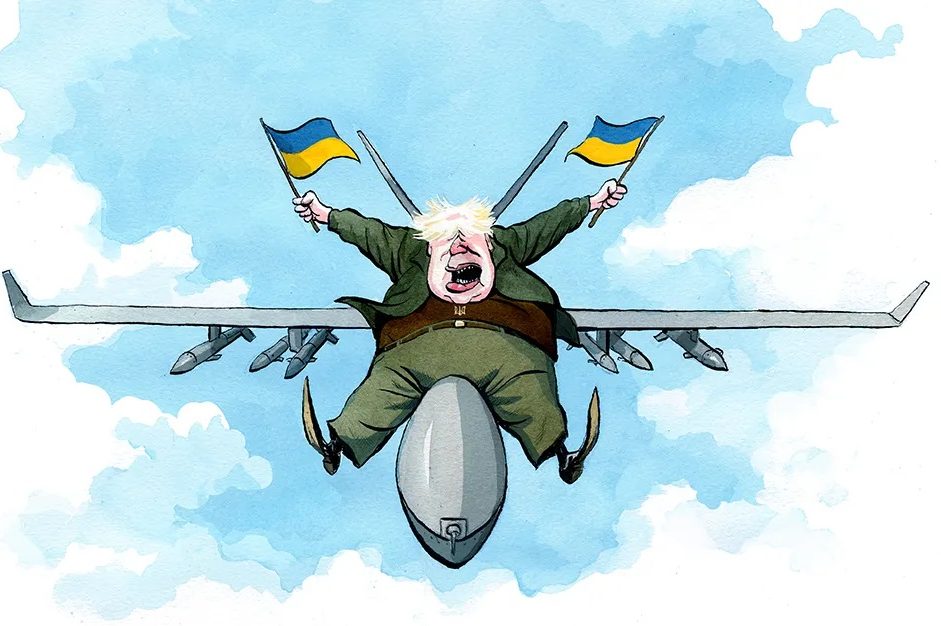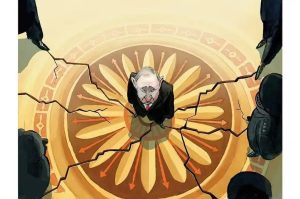When you visit the rehabilitation centers for Ukraine’s soldiers who have received life-changing injuries, you swiftly learn how to deal with the shock of what you see. You don’t flinch or look away; of course not.
You learn the habit of the skilled doctors and nurses and physiotherapists — of concentrating not on the wounds but on the individuals, on the men; and though many women have been killed or injured in this beastly conflict, I must have seen over a hundred badly injured soldiers in Kyiv and Lviv, in three different hospitals, and they all were men.
Do not believe for one second that these Ukrainian soldiers could be persuaded to lay down their weapons
You notice some remarkable qualities in these patients. They are not by any means all young, far from it. Some are in their forties and fifties. They are a citizen army: husbands, fathers, graybeards — men of my age. As you watch them trying to recover strength in the limbs that remain, kneading plasticine, throwing medicine balls, struggling again and again to perform some rudimentary task, you feel their determination to make the best possible use of the exemplary care they are getting: to rebuild something like a life.
As you talk to them, you rapidly discover that they don’t want to excite your compassion. They don’t want to be told how brave they are — because they don’t feel that they are especially brave. As a couple of them put it to me, rather fiercely, they think they were “doing their job.” They were doing something that was simply essential, and unavoidable, for their families and for the life of their country, and they had bad luck — as anyone can have bad luck in a dangerous job.
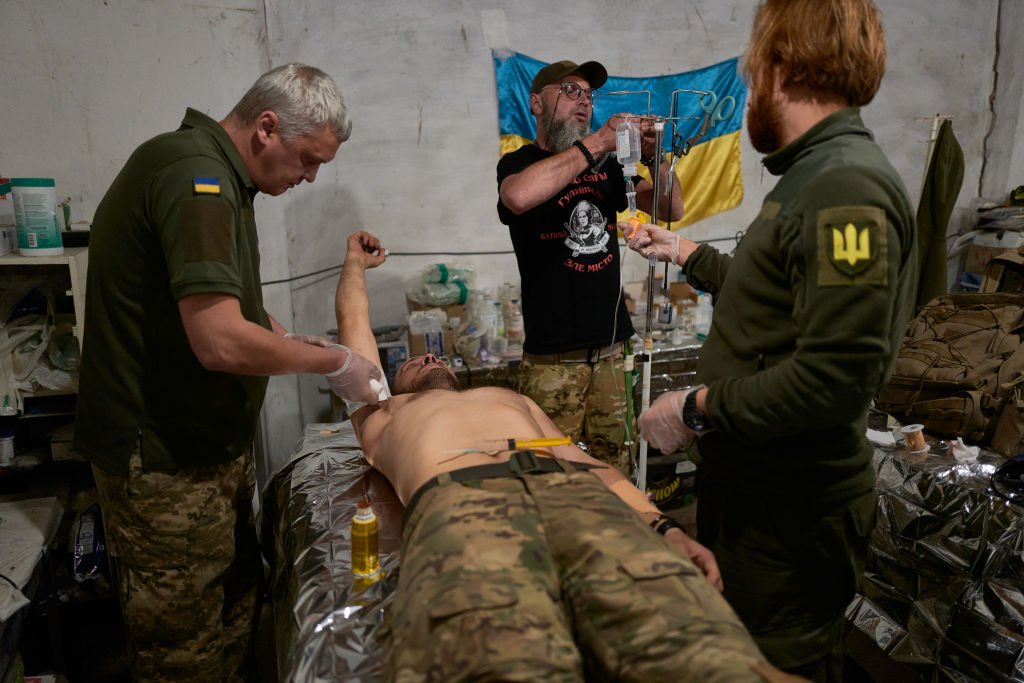
They got hit by shrapnel from a tank round or an artillery shell, or they trod on a mine, and they sustained injuries that would have been completely familiar to the battlefield medics of World War One; the difference being that today, a century on, the extraordinary advances in surgery and prosthetics mean that not only are they alive, but they want one thing above all else. That is to be able to go back to the frontline, and take up where they left off.
They don’t want any of your Siegfried Sassoon or Wilfred Owen-style lamentation; they don’t want any anthems for doomed youth or moaning about the pity of war. They want to get on with killing Russians and expelling the invader from their land.
Rather than talk about their injuries, they want to talk about the progress that their units or regiments have unquestionably made. The one thing that seems visibly to give them solace and satisfaction is the knowledge that ground is being retaken, and villages are being recaptured, and that their efforts have played a part in that success and — who knows — may do so again.
Of course you cannot help wondering, as you look at the shattered bodies of these men, to what extent they can ever really hope to live a normal life, let alone rejoin the armed forces of Ukraine — no matter how unconquerable and magnificent the spirit within. You therefore feel a sense of helpless rage at the continuing scale and pace of the human suffering.
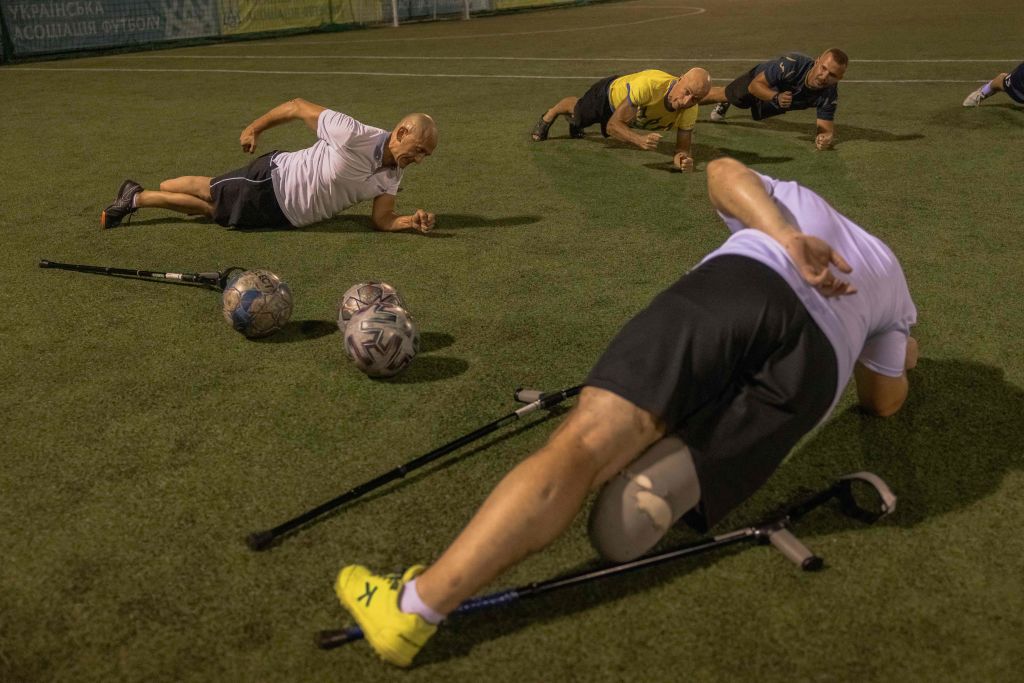
This war has produced something like 20,000 Ukrainian amputees, most of them in the armed forces; and the savagery is so great that every week these rehab and recovery centers are receiving dozens more. Bear in mind, too, that I was almost certainly being shown those who are most capable of making any kind of recovery at all, and there will be others whose physical mutilation or mental trauma is even worse.
It is now nineteen months since Putin miscalculated, and unleashed the biggest and bloodiest conflict in Europe since the end of World War Two. He has directly caused the killing or injuring of 300,000 Russians and probably about half as many Ukrainians. You stand in those hospital wards and feel aghast at the pain, furious that so many are still being fed into the meat grinder — and all because of the ego and folly of one man, the Moloch of the Kremlin.
Do not believe for one second that these Ukrainian soldiers — or the wider population of Ukraine — could be persuaded somehow to lay down their weapons or do a deal with Putin. They are not fighting at our behest, and will not stop because we say so. They are fighting a war of independence, because they refuse to bow down to terror and because they want their country to be free.
They find the idea of a negotiation laughable. In the last few days I did my best to probe them on this point — but I found not the slightest slackening of Ukrainian resolve. They don’t see how they could trade land for peace, because they don’t see how they could possibly believe a word Putin says. Yevgeny Prigozhin thought he had done a deal with Putin — and it didn’t exactly work for him.
There is only one thing they want from us, and that is the weaponry to finish the job — and so I simply do not understand why we keep dragging our feet. Why are we always so slow? How can we look these men in the eye, and explain the delay? Throughout this war we have underestimated the Ukrainians and overestimated Putin, and we are doing the same today.
The Russians now occupy barely half the land they held in the weeks after the invasion. They have been routed in Kyiv, Kharkiv, Kherson; and yes, the counteroffensive is going more slowly than some had hoped. But it is proceeding. It is only ten to twenty miles from the Ukrainian positions to Melitopol; and if they can get to that southern city, then their artillery will command the whole land bridge. They will be able to interdict movement between Russia and Crimea — a colossal strategic reversal for Putin. Even if they can’t do it in the next few weeks — or however much remains of the 2023 fighting season — they can certainly do it next year.
All we need is strategic patience, and a far greater sense of urgency about our military assistance program. Ukraine’s battlefield needs are changing, and we need to recognize that. A year ago or so we were worried about giving the Ukrainians tanks and armored cars, on the absurd ground that such support might be “provocative” to Russia. Now the drones have become so lethal that both sides are said to be parking their armor and walking.
The Ukrainians need man-portable air-defense systems (MANPADs) to take out the Russian helicopters. They need Patriot-style systems to protect themselves against attack from the air, and they need better long-range artillery to take out the Russian positions. The Himars have been valuable, but the Russians have been effective in their counter-measures. The Ukrainians want and need the ATACMs, the long-range missile systems that are still being withheld by the US, and they need more missile systems such as the UK’s Storm Shadow, which has proved to be extremely valuable.
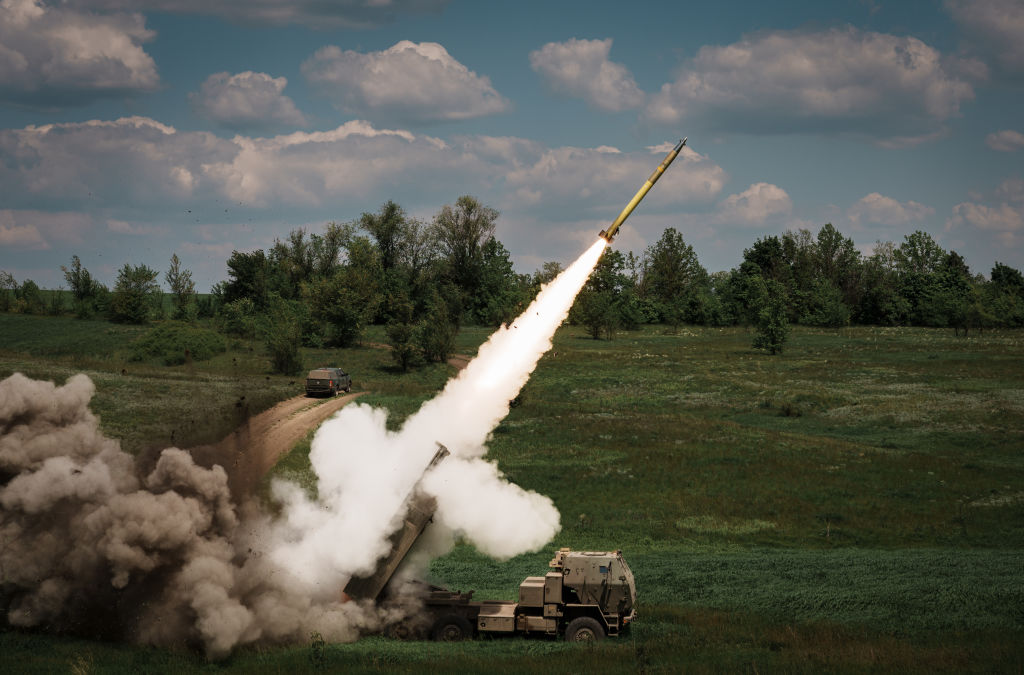
From the UK, they are hoping for more help with howitzers, with Stormshadow, with air defenses, and they want as much help as we can give on drone technology.
President Zelensky told me that he needs just 200 more sophisticated ballistic systems such as ATACMs, and the US has thousands in store. Why keep them on ice? What other purpose could they possibly serve that would better guarantee the long-term security of the West, including the United States?
Some voices in Washington have said that the US should pursue a “China First” strategy, and hold the ATACMs in reserve in case they have to be sent to protect Taiwan. What nonsense. The best way to deter an attack on Taiwan is to make sure that the Ukrainians win, and as fast as possible.
We are talking about a relatively trivial outlay for such extraordinary potential reward. The US has given only about 1 percent of its annual defense budget to support Ukraine’s armed forces, and the UK has given a fraction of what the US has given. There are no US boots on the ground, and no possibility of US bodybags coming home — and yet the stakes for the West are enormous. If Putin wins — and all he has to do, to claim a victory, is hang on to at least a chunk of the territory he has taken since February 24, 2022 — the dreadful message will go round the world: that this was the moment when the democracies pledged to stand up to the autocracies, and we flunked it. The story of Ukraine will be of lion-hearted Ukrainian troops finally betrayed by western loss of nerve.
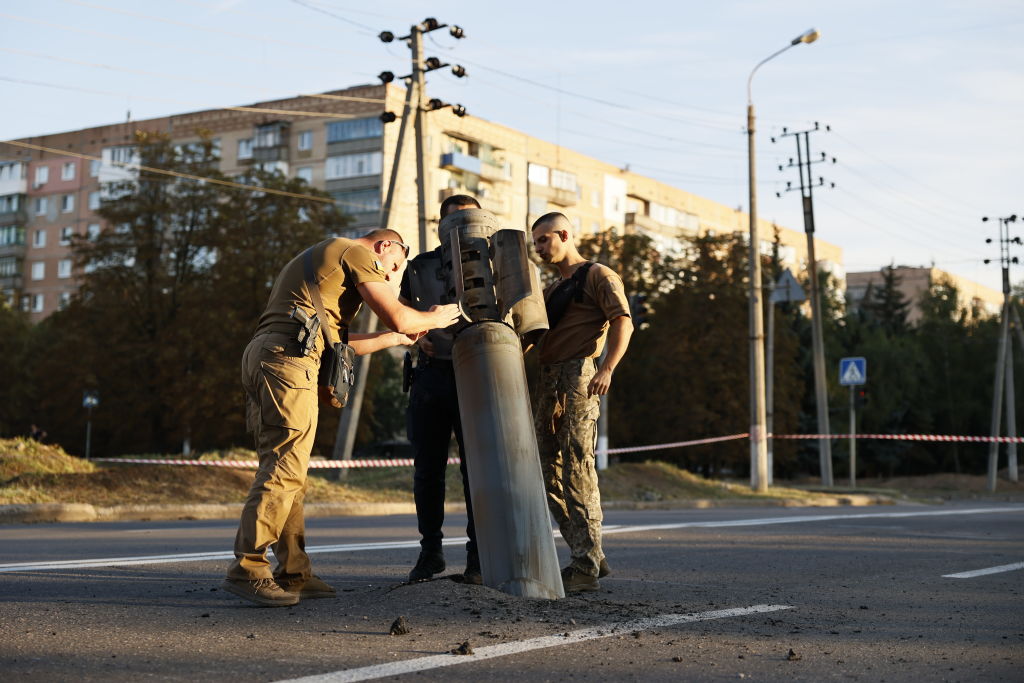
Around the global campfire the word will be passed that yet again we have been shown not to mean what we say, not to stick with our friends, and not to be willing to stand up for freedom and the rule of law — even when not a single western soldier is at risk.
If Putin wins in Ukraine, if he holds even a fraction of what he has taken, then the lesson will be clear: that aggression pays, that European borders can once again be changed by violence, with all that means for Georgia, the Baltic states, anywhere in the former Soviet Union, or former Soviet sphere of influence, where Putin fancies a revanchist and domestically rabble-rousing military operation.
A Putin victory would be a catastrophe for the West and for American leadership, and I don’t believe it is an outcome that could easily be endured by a US president, let alone one who wanted to Make America Great Again. And if, on the other hand, Ukraine wins and kicks Putin out — as, with our help, they can — then the reverse is true. Exactly the opposite message will be sent around the world: that we do care about democracy, that we are willing to back our principles, and that the West still has the guts to stick at something until we succeed.
It is naturally dismaying to see how many global swing voters there are, how many countries are willing to give Putin the benefit of the doubt.
The Ukrainians were appalled by India’s feeble G20 summit communiqué, and the Indian refusal, despite the pleas of Joe Biden, to allow Zelensky even to address the meeting in his usual fashion. All that will change once Ukraine wins: all that ghastly trimming and bet-hedging and Putin-greasing — all of it will fade from the agenda. That is because there is one thing the people of the world understand better than a thousand sermons on democracy and the rule of law — and that is military victory.
Victory for Ukraine will revalidate and re-energize the West and all we stand for. Above all, it will mean the liberation of a beautiful and entirely innocent country that has been selfishly and criminally attacked.
I believe that victory will come; and I believed it all the more strongly after talking to those injured soldiers. You see it in their eyes. You hear it in the ferocity of their expressions, their rejoicing in land recaptured. Whatever you think about nationalism, or national feeling, it is the most potent force in politics — stronger even than religion — and in his insanity Putin has intensified and provoked the most powerful modern nationalism we have seen. His troops, tired, mistrustful, far from home, have nothing in their hearts to match it.
That is why Putin will lose and Ukraine will eventually win; and since that is what must happen, and since that is what is going to happen, can we not, in the name of all that is holy, give the Ukrainians now the military assistance they need to bring matters to the speediest possible conclusion so that fewer human beings are thrown into the charnel-house of this pointless conflict?
I have asked it before, and I ask it again: what the hell are we waiting for?
This article was originally published in The Spectator’s UK magazine. Subscribe to the World edition here.



